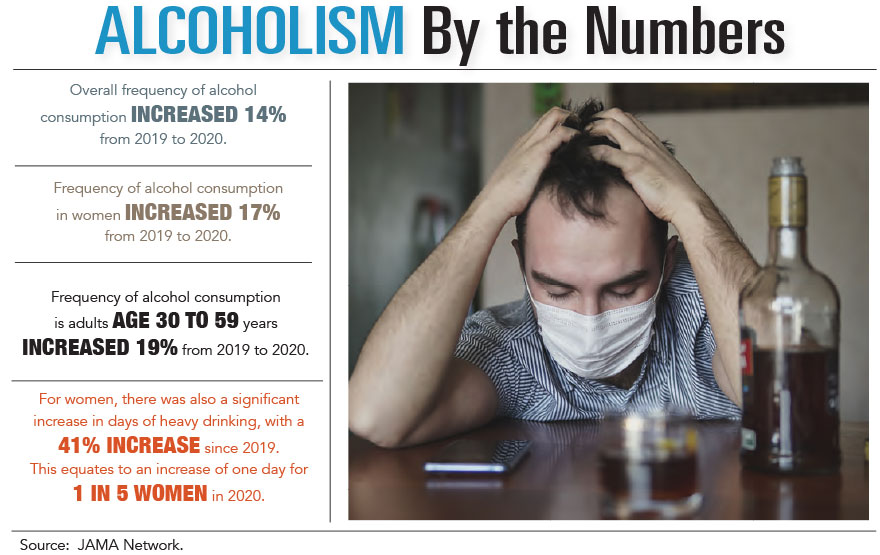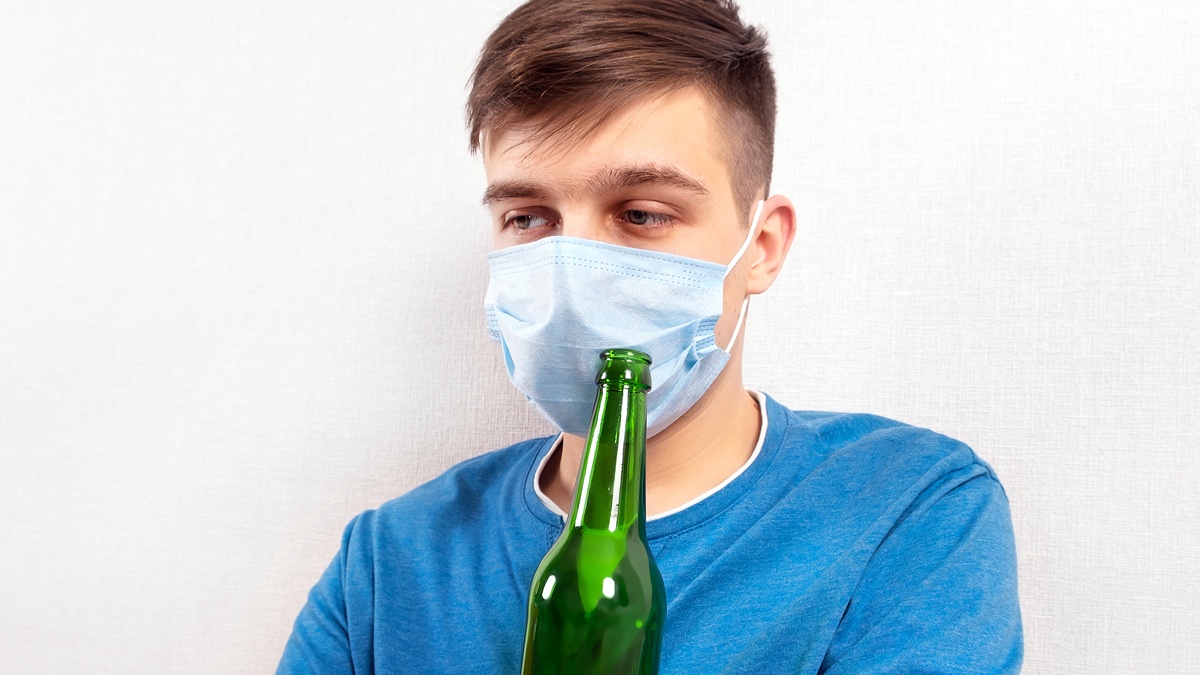A growing number of adults have turned to drinking to relieve the stress and uncertainty of the COVID-19 pandemic, leading to an increase in alcohol abuse and alcoholism. Radical social, biological and personal changes are providing already vulnerable people with more opportunities to drink excessively, limiting the success of their normal, healthier coping habits.
According to a study published in the Journal of the American Medical Association, online sales of alcohol rose 262% the week of March 21, 2020, the first week of lockdown in the United States, and there was a 54% increase in alcohol sales nationally.
“In the time of COVID, social isolation is primary risk factor. People are not attending their churches, the gym or other leisure activities as much right now. They can’t even see their family at the holidays without fear of unknowingly infecting their loved ones. We’re very isolated, and that’s causing an increase in alcohol consumption,” said Michael McLain, director of local provider relations at The Phoenix Center of Greenville.
McLain explained how alcoholism can develop from a variety of emotional and biological factors. Research shows that people are four times more likely to develop an alcohol or drug use disorder that runs in their biological family. The more people in the family, and the closer in the bloodline someone is to a relative with alcoholism, the greater the risk there is of developing a problem with alcohol. Co-occurring disorders such as anxiety, depression or bipolar disorder, as well as certain personality traits such as impulsivity, being outgoing/social, sensation seeking – liking adrenaline rushes and new experiences – and rebelliousness all can contribute to using substances at a higher rate to self-medicate or as a way to socialize or seek new experiences.
“It doesn’t mean that you will, but it means you have a higher risk,” McLain added. “Our choices, like how much and how often we drink, do matter as well.”
An increase in quantity and frequency of consumption are two of the most obvious indicators that someone is heading toward developing a problem with alcohol. In treatment, it is not uncommon for patients to report their tolerance increasing from six to 12 to even 18 to 24 drinks per day or per drinking occasion. Those with high tolerances may experience physical withdrawal, craving and memory loss while under the influence.
“Some feel a high tolerance is a sign of strength, not realizing that the higher it goes and the more it takes to feel impaired, the closer one moves toward having a severe alcohol use disorder. High tolerance is a vulnerability and an important indicator of future problems, not a strength. The higher the quantity and frequency of drinking, the more likely one is to develop health and impairment problems, not to mention other impacts such as financial, employment, legal and relationship issues that tend to present with alcohol use disorders,” McLain explained.
The impact of the increase in alcoholism is felt in families across South Carolina. The state Department of Alcohol and Other Drug Abuse Services reported serving 30,742 patients in 2020, with 18,606, or 61%, being admitted for an alcohol-use disorder.
Women are being affected disproportionately by the pandemic, whether through job loss, juggling work from home and virtual schooling responsibilities or managing the day-to-day needs of their families. As a result, they have increased their alcohol consumption more than men have during the pandemic. According to the study published in JAMA, alcohol consumption increased 17% in women during the first days of the pandemic.
Danielle Larkins, owner and lead therapist for Elodie Counseling in Summerville, is working with families and individuals who are being affected adversely by the pandemic and subsequently by alcohol use.
“I’m seeing an increase in divorces. I have also seen domestic violence problems increasing,” she said.
Larkins emphasized that alcohol abuse tends to exacerbate existing problems while simultaneously creating a depressive cycle, especially for those who drink because they’re depressed. They drink, and then their moods are pushed further down by alcohol’s natural depressant qualities. This causes more distress and increases the person’s urge to drink more.
“It’s a natural depressant, and it’s a coping mechanism to deal with those stressors or mental illness. You definitely have increased anxiety, impaired judgment, altered thoughts, poor decision-making – which will have a domino effect on the family, and it decreases your stress threshold levels and how much you can take – period,” Larkins explained.
For those who think they or a family member might have a problem with alcohol use, there are a number of resources available, even to those who are housebound due to COVID-19.
“One positive outcome of COVID-19 is that our telehealth counseling services quickly expanded across the state,” shared McLain.
The Phoenix Center’s services are available to children, adolescents and adults across South Carolina, including inpatient detox, residential treatment for pregnant women and women with children, outpatient individual/group counseling and medication assisted treatment. To get more information on treatment options for yourself or a loved one, go to www.phoenixcenter.org, or call Mike McLain at The Phoenix Center for a free consultation at 864-467-3769.
Elodi Counseling offers one-on-one counseling, group therapy, tele-counseling, eye movement desensitizing and reprocessing therapy, in-home visits in Summerville and throughout the state. To schedule a consultation, call 843-608-8851 or visit elodiellc.com
.
By Katie Thompson


